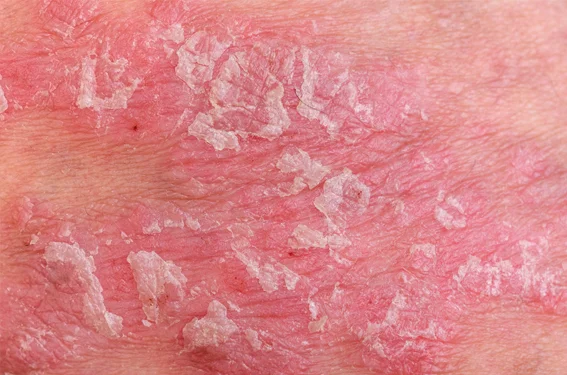Psoriasis
Close up photograph of Psoriasis.
What is psoriasis?
Psoriasis is a chronic systemic condition that is seen on the skin but also in the scalp and on the nails. It can also be noticed involving the joints and, more recently, we know that it is associated with cardiovascular disease and diabetes.
Psoriasis is seen on the skin as very well-defined red plaques with overlying scale. These are usually seen on the elbows and knees. If the area is very irritated then small cuts and splits of the skin can occur and this can lead to stinging. Sometimes psoriasis can occur in the flexural surfaces of the body which includes the genitals and also the armpits.
How is psoriasis assessed?
Dermatologists perform a clinical examination. This involves looking at the nails and the skin and also the scalp. A scoring index has been developed called the PASI score to help with this. The PASI score is the Psoriasis Area and Severity Index. This helps to assess severity and body surface area involved. It was used in clinical trials but is now used in practice to assess response to treatment.
What are the associations of psoriasis?
Psoriasis is now thought of as a systemic disease rather than just a skin condition. It is associated with cardiovascular disease, arthritis, skin cancer formation and other diseases. Psoriatic arthritis can be very disabling and can occur as soon as one year after skin psoriasis develops. It is very important to have early diagnosis and management with a rheumatologist if this occurs.
How is psoriasis treated?
Psoriasis can be treated in a number of ways including creams, light therapy, and medications. More recently, biologic medications have become available.
Topical treatments
Topical treatments involve the application of creams, ointments, and gels. This is used for patients who usually have only a small area of their skin involved. They can be very effective and include steroid creams along with vitamin D creams as well. Moisturisers are very important as are a soap-free wash.
Phototherapy
Phototherapy is very safe and effective treatment ++for psoriasis. It is used when a larger area of the body is involved. Usually, a 6-week course is required, with 2-3 visits a week. Please note that we no longer offer phototherapy services at NSDL from January 2024.
Oral therapy
Sometimes psoriasis can be severe enough that tablets are required. These are immunosuppressive medications including cyclosporin, methotrexate, and apremilast. Acitretin is a vitamin A derivative which is also used in treatment of moderate-to-severe psoriasis.
Biological therapy
Biologic therapies target the immune system and are a relatively new approach to managing psoriasis. They have strict guidelines for implementation and require other psoriasis therapies to have failed before consideration of this option. There are many available now and they can be life changing.

